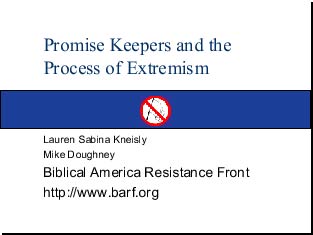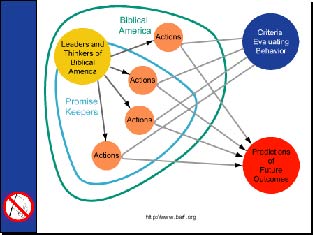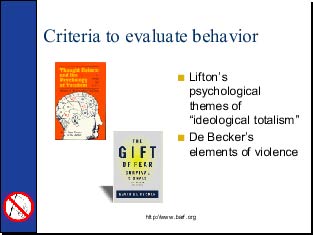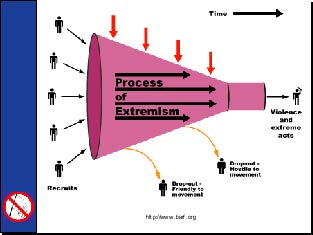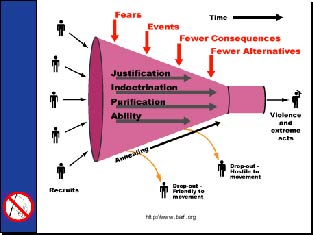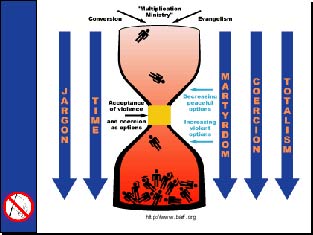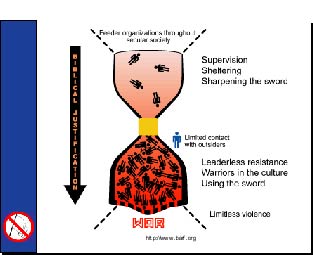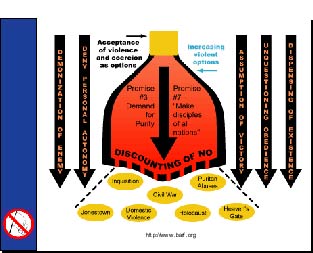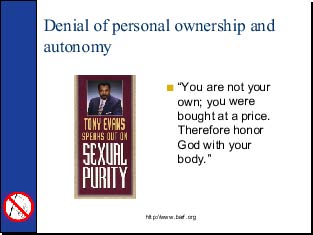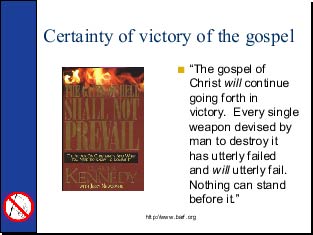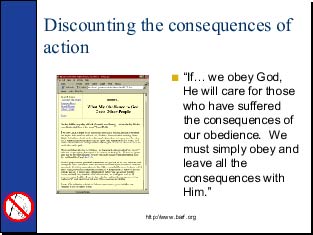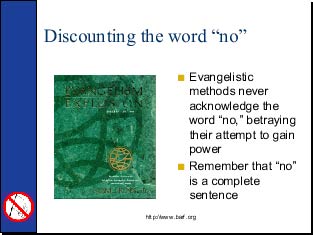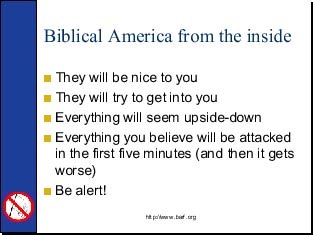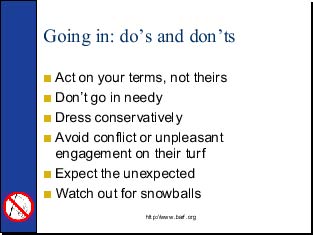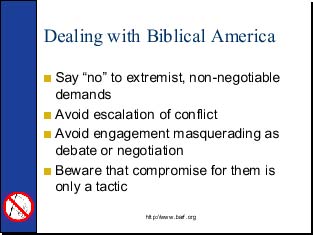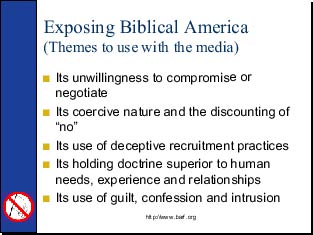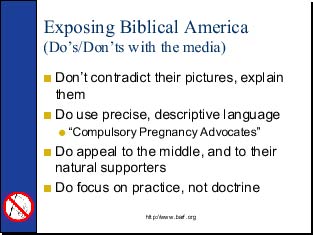We were part of a panel discussion entitled "Tracking and Combatting the Right: Focus on the Promise Keepers" at Hampshire College on April 3 and 5, 1998. These are the slides and notes we prepared for that presentation.
- The Process of Extremism
Slides: 1 2 3 4 5 6 7 8 9 10 11 12 13 14 - Oppositional research - attending events
Slides: 15 16 - Countering Biblical America
Slides: 17 18 19 - Biblography and Further Reading
Click on each slide to see a full-size view.
We're a two person think tank and we've been traveling around the country over the past few months attending conferences and events.
There is much that we could talk about from our experiences and the material that we've collected. Today we've elected to give a bird's eye view from where we see it - a broad overview of the Promise Keepers, the broader movement that they're a part of, and where we think it's going.
The Promise Keepers are part of a larger movement that we call Biblical America - we call it that instead of, for instance, the Religious Right because it is neither right nor left, nor exclusively political.
It does share the vision that their particular interpretation of the Bible shall be used as the basis of American governance and society - indeed, it insists that that was the original intention of the country's founders.
The aim is to evaluate the actions of Biblical America, to get an idea of why they do what they do. Then we may be able to predict the outcome, or at least make some educated guesses, as to what may result from their activities.
We've chosen two criteria to evaluate the behavior of Biblical America.
First of these are the themes of `ideological totalism' developed by Robert Jay Lifton through his observation of Chinese Communism in the 1950's. The other is the `elements of violence' described by Gavin de Becker in his recent book, The Gift of Fear. Although his elements are centered on one-on-one interactions, from observing the behavior of stalkers and other violent or potentially violent people, we think his elements may be applicable to groups and movements.
We've combined these criteria to develop a process of extremism.
Recruits are funneled into a process that may seem very benign at the beginning, but in its later phases can be dangerous.
Some people drop out for various reasons, some people may only go through the first part of the process and stop there, while others may take many years to go through the process.
There are processes going on inside the funnel, while the funnel is narrowing in size due to pressures from the outside.
- Development of a justification for using violence
- Indoctrination into a system that prohibits questioning of basic assumptions, creates a moral imperative to reach their goala
- A never ending cycle of purification, using guilt, shame, confession and peer pressure as tools of manipulation and reinforcement
- Development of the ability to accomplish extreme acts, both to accomplish violence or to do socially unacceptable things (like accosting people in bookstores.)
Meanwhile there are pressures from outside, some are out of the group's control, others can be manipulated to the group's advantage.
- Fear, of punishment, also of natural disaster, crime and other events outside the group's control (as an example, the fear of economic collapse, El Nino, Y2K, etc.)
- Fewer consequences - through social conditioning, the group's growing influence, or through indoctrination that the consequences are not their responsibility
- Fewer alternatives - peaceful alternatives are exhausted, making violent options more attractive
We can also refer to some parts of the process as annealing - "trial by fire," a hardening process in preparation for eventual action
Another way of looking at this process is as something like an hourglass. Novices are introduced through the top, and through time, are developed into leaders and warriors. Notice that the children of the leadership grow up in the bottom portion, having been raised there from birth.
Note that the glass of the hourglass becomes thicker toward the bottom; this represents the people inside the process becoming more isolated from the outside through time.
People are introduced into the process through evangelism, conversion and "multiplication ministry," a means by which churches may expand rapidly through aggressive marketing by laymen in the church.
The point of the process is to instill the acceptance of violence and coercion as options to accomplish the group's ends. As noted through the funnel diagram, one way this is done is to run out all peaceful options - through actually running them out, or through justification of more rapid means. Once violence and coercion are accepted, the volume of available options increases.
Other themes that we note here are:
- the increasing use of jargon and loaded terms, that is, words and language that carry different meanings inside the group from those generally known.
- Acceptance of martyrdom, to sacrifice oneself or one's children for the cause
- Acceptance of coercion of others to accomplish the group's ends
- The development of totalism, which may most briefly be
described as:
- Seeing the world in black/white, totally for or against the group; outsiders are judged to be totally supportive or totally against them
- The ideology of the group influences every personal decision; all aspects of life are viewed through the lens of the ideology
Through time, feeder organizations are established through secular society.
The first part of the process can be summarized as:
- Supervision - through the discipling process
- Sheltering - interaction with the outside world is discouraged
- Sharpening the sword
The second part:
- Leaderless resistance
- Warriors interacting with the culture
- Using the sword
Throughout, biblical justification provides the moral imperative driving the participants to action.
Ultimately, despite the fact that not all people introduced to the process actually pass through to the bottom, significant numbers of people are conditioned to accept violence and to believe that all peaceful alternatives have been exhausted. At that point war is possible.
Here we've cited two of the Promise Keepers promises; one is a demand for purity, the other, the "Great Commission" (Matthew 28) which states "go make disciples of all nations." Another key part here is the discounting of the word "no." Refusal by outsiders doesn't preclude action; they will ignore the word or attempt to negotiate it away.
Here are other themes that come into play at this stage:
- Demonization of the enemy
- Denial of personal autonomy - "you are not your own"
- Assumption of victory
- Unquestioning obedience
- Dispensing of existence, that is, separating people into "people" and "non-people;" this also may take the form of deciding who lives and who dies, who are masters and who are slaves.
These themes, and this process, have been prevalent in other violent events through history, and also are often present in domestic violence.
The denial of personal ownership and autonomy is often heard as "you are not your own, you were bought at a price, therefore honor God with your body." This theme is the basis not only for opposition to abortion, but also to attacks on queerness and sex in general, opposition to euthanasia, control of health care, and is sometimes seen as opposition to tattoos and piercings.
Failure is not tolerated, as exemplified by this quote from D. James Kennedy. There is an overwhelming assumption of victory throughout Biblical America. This may, of course, be used to support almost any action in support of obedience.
Obedience without regard to consequences may also be identified, which is a concrete example of the discounting of consequences. This quote is from a `daily devotional' that can be found both on the web and in your bookstore.
Evangelistic methods never acknowledge the word `no'. This book (Evangelism Explosion by D. James Kennedy) has been identified as one of the most popular evangelistic manuals; over 400,000 copies of it have been sold since 1970. There is no allowance for the acceptance of a refusal; such refusals are only considered to mean, "not now," with the admonishment, "Do not attempt to pick green fruit." This is "discounting of no" and is addressed extensively by de Becker as a reliable indicator of an attempt to gain power.
To sum up, Biblical America is running a totalistic, extremist process; its entire purpose is to grow a crop of warriors to do battle against a culture that they consider to be destructively hedonistic throughout.
- Process, not ideology - The ideology is a motivator, but it is the actions that matter and that should be analyzed and criticized.
- Culture, not politics - The movement demands cultural change as a basis of political change; the movement itself is not fundamentally political in nature.
- Personal, not social - It uses a personal experience of manipulation, or conversion, to motivate people to demand satisfaction, for what they want now without regard to history, consequences or future disaster
- No inherent limits - Without any regard for human welfare, there are no limits to their action, and there are obvious efforts to remove, limit or discount consequences
- Ignores human welfare - Consistently exhibits Lifton's theme of doctrine over person
Some observations from our experiences attending events. Despite what we know about their actions, each of them can be personable, and we believe that many of them are motivated by the best of intentions. Intent, friendliness and civility are irrelevant when evaluating their ultimate actions.
They will try to get into you, to convert you. Your presence in their event can be taken by them as a sign that you are close to conversion.
Everything will seem upside-down. Even simple words like `liberty' and `freedom' will be used by them in odd ways to support their power. They will claim that the `holocaust' is what is happening to Christians today, while they plan a similar fate for their opposition.
Everything you believe will be attacked in the first five minutes, and then it gets worse.
Be alert - events have a way of snowballing out of control.
Always act on your own terms; do not allow yourself to get into situations of what de Becker calls `false teaming', and avoid making changes in plans through their encouragement or to otherwise give in to subtle demands.
Don't go in needy - not hungry or sleep deprived.
Dress conservatively to blend-in somewhat. While not singing or applauding, we generally sit and stand with the group so as not to be overly conspicuous.
Avoid conflict on their turf. Save that for out on the street!
Expect the unexpected, and watch out for what we call `snowballs.' We have been in a situation, for example, where an altercation with counter-demonstrators has rapidly escalated and we've been mistaken for them.
We start by realizing that we have certain non-negotiable values. We value our lives, and we believe that individual autonomy, that the ownership of one's own body, is absolute and that that is not a value that we should ever even begin to negotiate away.
From that point, we clearly draw the line by saying `no' to the extremist demands of Biblical America that they themselves have clearly shown are absolute demands that are not open to negotiation from their side.
Should there be some problem in distinguishing whose absolute demand results in a betterment of human welfare, and whose results in death, consider this. Should they lose, the paper tiger that they've created for at least the past 25 years to support their work collapses. Each of them will continue to live, and despite their protestations that Christians are being persecuted in this country, will be generally unaffacted. In contrast, should we lose, we will be imprisoned and executed.
If possible, avoid escalation of conflict. We think the best way to do this is to clearly state one's position before conflict begins.
We saw two contrasting examples of how and how not to avoid escalation on a recent visit to Florida. Operation Rescue demonstrators, after entering a Barnes and Noble bookstore, were not clearly told that, after being removed from the store, that they would be arrested if they returned. They then returned to the doors and battled with customers, followed by another calling of the police (who could actually do nothing since the store wouldn't press for arrests) which of course afforded Operation Rescue more opportunities, if not to influence the public, to instruct their children in the tactics of extremist action.
The counter example was that of Disney, whose security forces immediately informed OR demonstrators, as they arrived on property, that they would be immediately arrested if they attempted any form of demonstration on their property. So OR turned tail and left.
Avoid engagement if the object is only to attempt to wear you down, to debate or negotiate non-negotiable points.
Beware, also, that compromise for them is only a tactic, not an endpoint. They will be back for more.
We've identified a few themes that may be used with the media to expose the methods that are used by Biblical America. Most of these we've already talked about (discounting of `no', negotiation as a tactic), we can also talk about deceptive and coercive recruitment tactics, doctrine over person and its misuse of confession.
Another method, if you're in a situation with media or your own video present, is to do what we do. Say something like, "I've had many years to consider what you're saying and my answer is `no'. There is near zero chance of agreement or even compromise between us, and we must share the planet somehow. Now what?" What often happens is, again, the weaseling around the word `no' that is much more obvious - often to say that "we think that eventually most people will agree with us, and those that don't God instructs us to treat with mercy." To which you can chime in and say, "while you're stoning us to death."
When talking to the media, be careful not to contradict the pictures; explain what the activities and the language of Promise Keepers actually means. Be precise in language and don't use their jargon. Try to appeal to the middle, to people curious about PK and who might be attracted to it. And above all, don't leave yourself open to a charge of religion-bashing - talk about what they do first, and not about doctrine.
Criteria for analyzing and predicting behavior
- De Becker, Gavin. "The Gift of Fear: Survival Signals That Protect Us from Violence." Little Brown and Company, 1997
- Lifton, Robert Jay. "Thought Reform and the Psychology of Totalism: A Study of 'Brainwashing' in China." The University of North Carolina Press, 1989
Reference
- We recommend either several different bibles or a "parallel" bible that shows the same verse in several different versions.
- Clarkson, Frederick. "Eternal Hostility: The Struggle Between Theocracy and Democracy." Common Courage Press, 1997
Cults and Cultic Studies
- Hassan, Steven. "Combatting Cult Mind Control." Park Street Press, 1988
Totalistic Evangelical Christianity
- Kennedy, D. James. "Evangelism Explosion: Equiping Churches for Friendship, Evangelism, Dicipleship, and Healthy Growth." Tyndale House Publishers, Inc., Fourth Edition 1996
Racial Reconciliation
- Hayford, Jack W. (Executive Editor). "Race and Reconciliation: Healing the Wounds, Winning the Harvest." Thomas Nelson Publishers, 1996
Promise Keepers
- Bryant, David. "Stand in the Gap: How to Prepare for the Coming World Revival." (With Forward by Bill McCartney) Regal Books, a Division of Gospel Light, 1997 (Actually a revised edition with study guide of Bryant's book "In the Gap." 1977)
- Janssen, Al, Editor. "Seven Promises of a Promise Keeper" Focus on the Family Publishing, 1994
- Wagner, E. Glenn Ph.D. "The Awesome Power of Shared Beliefs: Five Things Every Man Should Know." Word Publishing, 1995
- Trent, John. "Go the Distance: The Making of a Promise Keeper." Focus on the Family Publishing, 1996
- "Stand in the Gap: New Testament" Contemporary English Version, Commemorative Edition. Published for Promise Keepers, American Bible Society, 1997
- Hicks, Robert with Dietrich Gruen. "The Masculine Journey: Understanding the Six Stages of Manhood." Promise Keepers Study Guide. Navpress Publishing Group. 1993
- Horner, Bob, Ron Ralston, & David Sunde. "The Promise Keeper at Work." From the Promise Builders Study Series. Focus on the Family Publishing, 1996
- Horner, Bob, Ron Ralston, & David Sunde. "Applying the Seven Promises." from the Promise Builders Study Series. Focus on the Family Publishing, 1996
- Evans, Dr. Tony. "The Victorious Christian Life: A Guide to Spiritual Success." Thomas Nelson Publishers, 1994
- Evans, Dr. Tony. "Tony Evans Speaks Out on Sexual Purity." Moody Press, 1995
Other general Biblical America references
- Schaeffer, Francis A. "A Christian Manifesto." Crossway Books, 1981
- Van Den Aardweg, Gerard J.M. "The Battle for Normality: A Guide for (Self) Therapy for Homosexuality, Constructive Help and Support for Men and Women Troubled by Unwanted Homosexual Feelings and/or Behavior." Ignatius Press, 1997
- Brooke, Tal. "America's Waning Light: The Betrayal of our Christian Heritage." Moody Press, 1994
- Kennedy, D. James. "The Gates of Hell Shall Not Prevail: The Attack on Christianity and What You Need to Know to Combat it." Thomas Nelson Publishers, 1996
- Lawler, Phillip F. "Operation Rescue: A Challenge to the Nation's Conscience." Our Sunday Vistor Publishing Division, 1992
Web Pages
- Biblical America Resistance Front, http://www.barf.org/
- "My Utmost for His Highest", a daily devotional by Oswald Chambers. We referred to the January 11 entry in our discussion of the discounting of consequences.
- The Washington Post's "Cult Controversy" section. Reprinted here is the entirety of Chapter 22 of Robert Jay Lifton's "Thought Reform and the Psychology of Totalism." Now available via Apologetics Index.
Originally posted 1998-05-02
Links updated 2006-07-23
